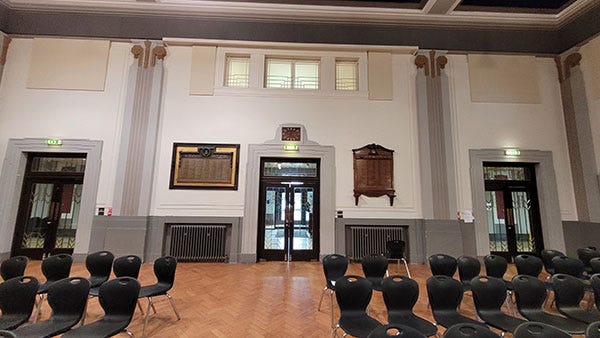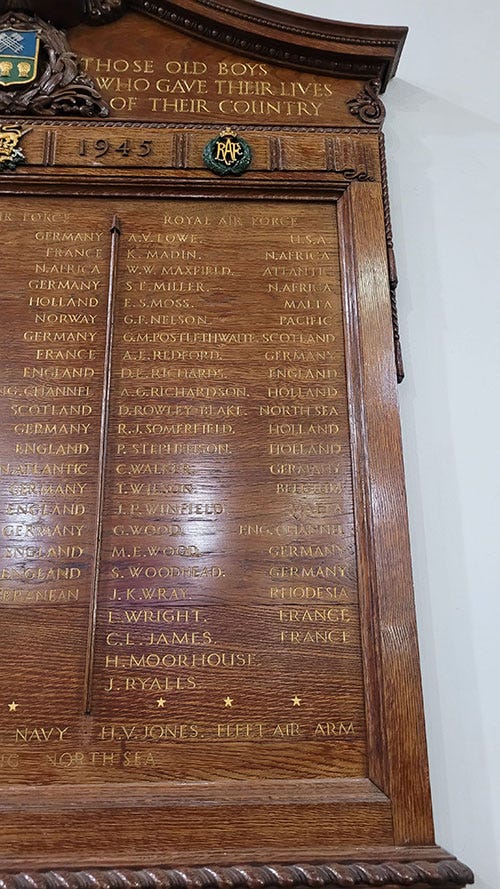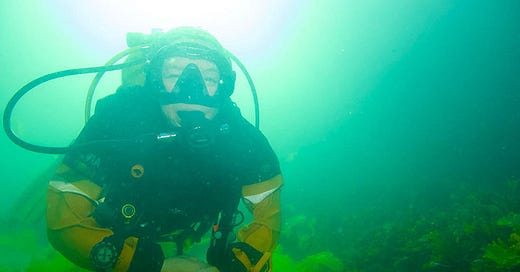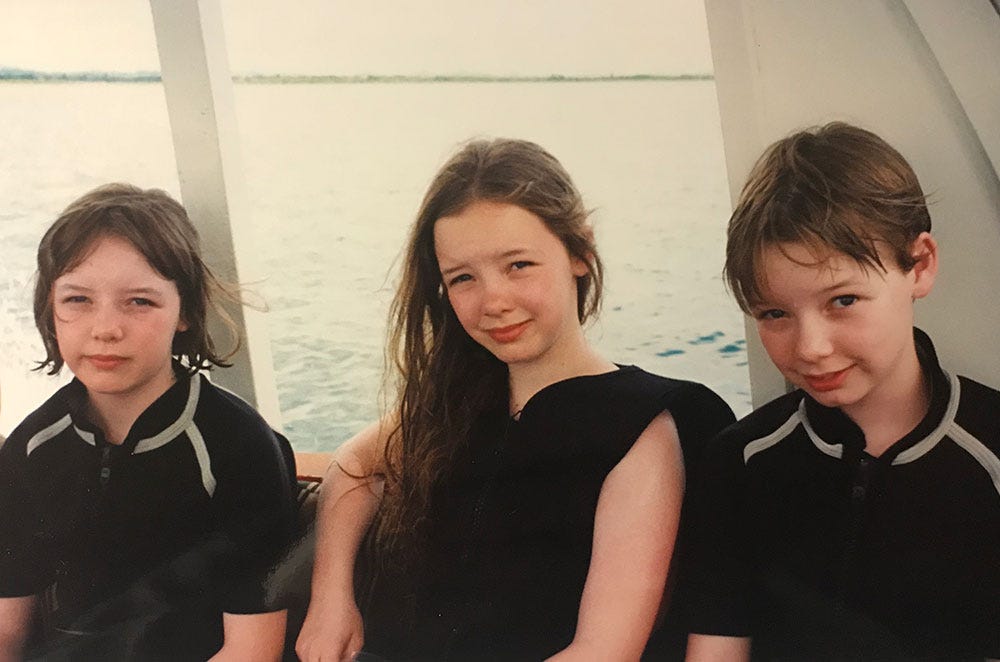The Dive: my Pacific panic
Have you ever leapt into something, then realised you’re way out of your depth?
I spot the dive school next to our hotel. Learn to Scuba dive in a day? Brilliant! I’ve always wanted to do that. Family fun ahoy!
It’s March 1999. We’re in Fiji for three nights, en-route to see my oldest friend, Vicki, who’s emigrated to New Zealand. It’s the holiday of a lifetime for Ian and me and our triplet daughters, then aged twelve.
I know I’ll be good at this. Sure, my only real triumph in the water up to this point has been earning my life-saving badge at junior school. That involved diving into the local pool in pyjamas, retrieving a brick from the bottom and demonstrating I could haul a floundering classmate to the pool edge by cupping his slippery chin. But I remind Ian that I’ve always been fascinated by synchronised swimmers, who smile so enthusiastically while holding their breath for an eternity. And I have such fond memories of watching Jacques Cousteau on the telly as a child. He was so at home down there in his flippers, swimming alongside the whales, that you’d think he’d been born in Atlantis.
I check the girls are old enough to participate. It’s a yes! The forecast is a bit iffy, but we’re good to go the following day, as long as the weather stays on our side.
Next morning, we cram ourselves into wetsuits, get loaded up with our equipment and flipper up and down the hotel pool as instructed, tanks of oxygen on our backs, learning how to regulate our breathing and adjust our depth. A doddle, I think, though Ian and Alex are having trouble equalising the pressure in their ears.
We all pass our swimming pool trial.
The first surprise after lunch is that reaching the perfect 12-metre dive spot involves a 40-minute boat trip. Naively, I thought maybe we’d simply wade into the ocean from the beach.
The second surprise is that the calm skies of the morning have been replaced by looming, rain-laden clouds. But we’re assured that out at sea all is fine. There are rarely any currents in the chosen dive spot. We will almost certainly see tropical fish flitting among the coral.
We swig water to stay hydrated, as the boat bounces across the waves.
“So who’s first?” asks Vince, the lead instructor, once the boat is finally anchored, out of sight of land.
“Me!” I say. I’ve suggested this family adventure. Must set a good example. I have this under control.
I stand and realise my stomach isn’t where I left it. The ocean is tipping and rolling and I’m nauseous.
The oxygen tanks are hoisted onto my back and the weighted diving belt is clipped around my waist. I’m reminded to keep my breathing even, and of how to clear my mask if it fogs up. Always keep each other in sight. Remember the “buddy” hand signals.
I sit on the edge of the boat, back to the water and flop into the sea. Bobbing up, I give everyone a smile and a thumbs up. That’s the important thing. Show them I’m okay.
But AM I okay? My stomach is jumbled by the waves, which are so much sterner now than they’d looked from the boat. I grasp the line, while one-by-one the rest of the party joins me in the water.
We have two instructors (Vince and Freya1) between five of us. There is a young Norwegian couple, too, who are experienced enough to dive independently.
Olivia and Becky are smiling and buoyant in every respect, no trace of anxiety.
Ian has on his “yikes!” face and yells, “Choppy, isn’t it?!”
Vince leads Olivia and Becky away and disappears under the water with them, reef-wards. Freya hangs back with Alex.
I take a last gulp of fresh air, close my lips on the mouthpiece, adjust to the suck and hiss of the oxygen, and let go. It’s a relief to sink below the surface and escape from the waves.
Remembering what I’ve been taught, I adjust the buoyancy of my jacket to let me descend, using my flippers to propel me gently downwards. Ian’s behind and to my left. I’ve already lost sight of the three ahead of me. There’s a lot of silt.
I adjust the pressure in my ears every few feet, pinching my nose, puffing out my cheeks. An A-star student. Glancing upwards, I can no longer see the shadow of the boat. Below, no sign of reefs yet. Just murk.
Descending further, the ocean floor is suddenly right there. The sea is churned up. No reef. No gloriously-coloured fish. No Vince. No Becky or Olivia. I turn to my left. No longer any sign of Ian. Or of Freya and Alex. That can’t be right. We’re supposed to stick together.
I check again, doing a full circle this time. Just a fog of ocean and the sound of my own lungs sucking in and releasing oxygen. The noise is getting louder and faster. I’m pulling the air in hard. It’s meant to be regular. I can hear my heart thudding. That’s not right. I’m supposed to stay calm.
This is all wrong. I’m at the bottom of the Pacific Ocean, practically blind, completely alone. Where’s Ian? Where are my children? Am I the only one cocking this up? Are they in trouble, too?
The weight of the sea presses in and I feel like I’m going to implode. I can’t bear it. An image of Holly Hunter as Ada, in a crinoline, pulled into the ocean by her eponymous piano, appears in my head.2
I put a foot on the bottom, stirring up more silt, and push myself upwards. I’m not supposed to come up fast, even from twelve metres, but I can’t stand the weird air and the way the only noise is from my own body, my frantic breathing, my racing heart, the sea water seeping in to my mask.
I’m desperate for the fresh air waiting at the surface. I kick and kick. Finally, it’s there, I’m there, and I pluck out my mouthpiece to gulp the air and instead drink in salt water, as the swell of the next wave smacks me in the face.
Breathing has never been this hard. I’m a strongish swimmer, but I’m limp and leaden trying to tread water, my limbs as useful in water as a scarecrow’s. I’m flailing. Where’s the boat?
It appears in the distance, making its way towards me. I’m floundering. The sea is dragging me under. I’m swallowing more water.
The skipper is gesturing to me and shouting. Freya and Alex are now visible in the distance. Freya is waving wildly at me and yelling something.
Ian emerges, nearby.
The skipper throws me a rope. I grab it, then hang from it, inert.
He reaches under my arms to haul me onto the boat, where he relieves me of the weighted belt, tank and mask and I flop onto the deck, gasping, like a fish landed on a trawler. Then he grabs Ian.
Ian is standing over me, anxious. The life gradually creeps back into my limbs, I roll over and pull myself onto the bench. Within seconds, I’m heaving over the side of the boat, letting out the briny contents of my stomach and the seafood lunch I ate two hours earlier, offered back to the ocean.
Freya and Alex are next back on board. Freya wraps a blanket around me. The Norwegians join us, looking concerned.
“You know, it’s not just beginners who forget to reinflate their jackets,” the man says consolingly. “More divers drown at the surface than when they’re actually diving.”
I’m suddenly alert, as is Ian.
Freya nods. “That’s what I was trying to signal to you: inflate your jacket.”
I try to compute it. I can’t believe I forgot something so basic. No wonder I was so leaden, with all that equipment dragging me down.
“People die?” I ask.
Freya nods again. “It happens.” And then adds quickly, “Though we have a very good safety record here.”
As I’m taking that in, I look at the sea.
“Where are they?” I ask. I’m only now thinking of my other two children. “They’ve been out there ages.”
Freya scans the ocean, points and says, “Don’t worry, they’re over there. I can see bubbles. See? Can you see the bubbles?”
“No. Are you sure? I can’t see anything.”
I sink back and wait. I have no energy to worry.
A few minutes later, three heads emerge close to the boat. Olivia and Becky give thumbs up signs, reinflate their jackets, bob towards us, smiling. The skipper helps them on board.
We hear each other’s stories. Their dive has gone to plan. Even with the silt, they saw the fish! They saw the coral!
Alex had problems with her ears adjusting to the pressure, which was why Freya fell behind with her at the surface. That had left Ian and me isolated, then separated.
The skipper said that in these usually still and clear waters, a strong current had swept us far from the boat, so he’d had to raise anchor and move it to meet me. He’d realised I was in trouble.
On the voyage back to the island, we smile and make light of it, but the sky is dark, rain is falling and there’s a tension between the two instructors and the skipper that wasn’t there before. There are whispered recriminations. It was a bad idea to attempt this, with a storm brewing. They are shaken.
I’m shaken, too. What was I thinking, assuming I could learn to dive in a hotel pool and be Jacques Cousteau by the afternoon? Risking everything.
That night, I cry against Ian’s chest.
The next day, the sky bright once more, the ocean calm, we borrow snorkels from the hotel and float face-down in the shallow bay. Inches below the surface are the azure and golden fish I’d wanted to see. I scarcely get my hair wet.
The top image is of my daughter, Olivia, diving off the coast of Cornwall a couple of years ago. She got the bug for Scuba diving as an adult. Me? Never again!
Over to you: Have you ever leapt into something, gung-ho, then realised you were way out of your depth? I love to hear your thoughts. Please do comment below if you’re able.
Thank you to everyone who responded to my piece last week, Champagne. Unopened. 1945. Your comments were thoughtful and profound. So many of you are keepers of important family stories.
I wasn’t sure Gordon’s story would resonate, but it ended up with more views in its first 24 hours than any other piece I’ve shared here. I was particularly touched that staff at Gordon’s old school in Sheffield sent me photographs of the RAF memorial plaque that bears his name, A G Richardson, still in place in the school hall.


Clicking the heart, commenting and/or sharing this piece will help other people find my writing.
Thanks for reading, and if you haven’t already subscribed, I do hope you will!
Or, if you wish, there is a Wendy’s World tip jar:
Until next time!
© Wendy Varley 2025
Names have been changed.
Jane Campion’s 1993 film, The Piano, starring Holly Hunter.







Well that put me off ever trying to scuba dive!
Wendy - the scene on the ocean floor was so fully embodied and immediate - thank you for writing it - and how happy I am to know that everyone got through it okay in the end. 💚